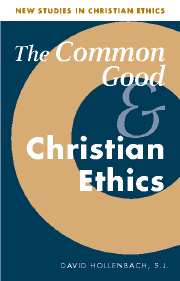3 - Recovering the commonweal
Published online by Cambridge University Press: 05 June 2012
Summary
A long time ago, Cicero expressed concerns like those we have been outlining about the likely effect of the waning of a vision of the public good on the future of the prosperous Roman Empire of his day. Fifty years before the birth of Christ, Cicero had concluded that the citizens of Rome no longer possessed the common vision required if they were to be a people at all. They had lost the moral consciousness needed to sustain their common life together. Cicero used the Latin phrase res publica to describe this common life. Literally this means “the public thing.” It can more aptly be translated as civil affairs, the commonweal, the common good, a commonwealth, or simply a republic. Cicero defined the commonweal this way:
Res publica, res populi, populus autem non omnis hominum coetus quoquo modo congregatus, sed coetus multitudinis iuris consensu et utilitatis communione sociatus.
A commonwealth is a thing of the people. But a people is not any collection [coetus] of human beings brought together [congregatus] in any sort of way, but an assemblage [coetus] of people in large numbers associated [sociatus] in agreement [consensu] with respect to justice [right, juris] and a partnership for the common good [utilitatis communione].
Cicero's use of the Latin words coetus, congregatus, consensu, and communione points directly to the social union he presupposes must exist in a republic. Persons are envisioned as bound together by strong connections.
- Type
- Chapter
- Information
- The Common Good and Christian Ethics , pp. 65 - 86Publisher: Cambridge University PressPrint publication year: 2002



